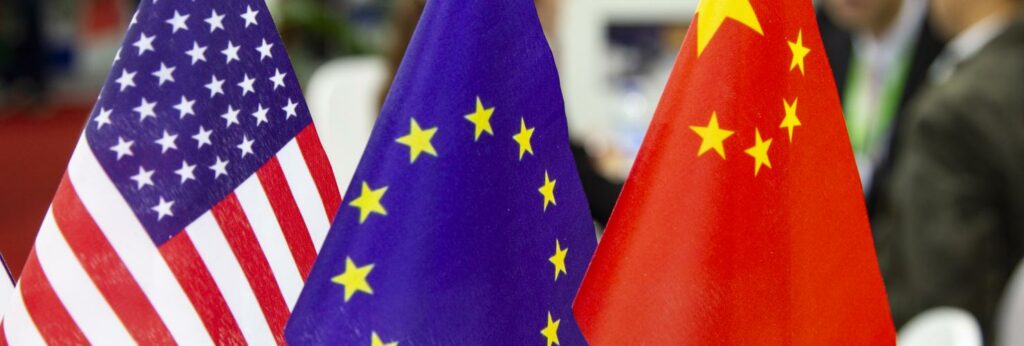by Gesine Weber

Over the past four years, the EU’s inability to balance its position between the US and China proved to be extremely challenging. Its member states can neither afford to loosen their ties with their long-standing ally across the Atlantic, nor risk a large-scale decoupling from the giant in the East. The alliance with the US is an essential security guarantee for Europe and perceived as vital, especially by countries in Eastern Europe. Putting this relationship at risk would leave Europe’s eastern flank exposed to the unpredictable aggression from Russia.
At the same time, China holds crucial political weight in international affairs: besides its status as a major trading partner for Europe, Beijing is now heading four out of fifteen UN organisations. Turning completely away from China could therefore be seen as a rejection of global cooperation with an increasingly global player. As such, the EU finds itself in a delicate balancing act. Decision-makers across Europe urgently need to prevent the EU from falling as the first victim of the Thucydides trap between the two powers.
Keeping China on the political agenda
The necessity for the EU to find a common strategy for China is not new. Since the election of American President Donald J. Trump in 2016, the challenge of mitigating US-China competition grew to become an important issue for policy-makers in Europe. Despite transatlantic relations at their lowest point during this time, Trump’s China policy spurred on a European awakening towards China. This shift happened in two ways. Firstly, it put active policy-making vis-à-vis China and the Indo-Pacific high on the political agenda, counter to the region’s relative neglect in the Common Foreign and Security Policy (CFSP) before.
Secondly, however, European reluctance to endorse the US’s maximum pressure strategy towards China underlined the diverging opinions and thereby unveiled the lack of a comprehensive EU strategy on China. Despite the release of documents such as the strategic outlook on China or the 2020 Agenda for Strategic Cooperation, there has, so far, not been a comprehensive guideline or strategy on the EU’s current and future action towards China in the different realms of foreign affairs, ranging from trade to security, to technology, so on and so forth.
Presently, should President-Elect Joe Biden wants to credibly translate his value-based foreign policy discourse into practice, there is a need to cooperate with the Europeans. In this context, finding a common approach towards China might be possible at least in some policy areas. Although President Biden will most likely seek closer cooperation with the US’ European partners, there will be little patience in Washington for intra-EU or EU-NATO power struggles or debates on the wording. This is especially the case for France and Germany: the two most influential EU member states are currently getting lost in semantic quarrels on European strategic autonomy - a term that is highly contested in Germany and a concept strong advocated for by Macron -, although both actually want the same things, to advance European security and defence.
US elections as a potential driving force for EU strategy-making
Over the history of European integration, the functionalist approach of ‘form follows function’ often demonstrated the EU’s ability to overcome challenges. New policies and approaches were first and foremost designed to serve a certain objective, and institutional adaptation could follow at a later stage of this process once the output matched the expectations. In this sense, the US elections could catalyse European strategy-making.
As EU leaders have already declared their willingness to cooperate with Biden on China, it is now important for the latter to define their priorities and identify areas of cooperation. Such a development ought to happen first among the member states and then between the EU and the US. Despite the EU member states’ diverging opinions on some issues, especially on the 17+1 format, there is a growing consensus that the EU requires a common approach to China.
Accordingly, a window of opportunity is opening here for European strategy-making. Such a China strategy, however, is not to be solely focused on the identification of threats. No, this exercise should also concentrate on drafting a positive agenda on China. The potential of global cooperation, with a broad regional and multilateral approach, is to be pursued. If the EU and its member states achieve this objective and manage to present a comprehensive approach on China - ranging from foreign investment to security in the Indo-Pacific to regulation of new technologies and environmental challenges - strategy-making will succeed thanks to geopolitical drivers — and without getting lost in technical debates. Instead of wedged in between China and the US, the EU could emerge as the balancer of both.
Gesine Weber is a first-year PhD Candidate at the Defence Studies Department, King’s College London, and works as a Program Assistant for the Paris Office of the German Marshall Fund of the United States. She holds a master’s degree in European Affairs (cum laude) from SciencesPo Paris and a master’s in Political Science from Freie Universität Berlin. Her research interests include European defence cooperation, which she focuses on in her PhD thesis, the CSDP, geopolitics and questions of global order.
Gesine Weber
Gesine Weber is a first-year PhD Candidate at the Defence Studies Department, King’s College London, and works as a Program Assistant for the Paris Office of the German Marshall Fund of the United States. She holds a master’s degree in European Affairs (cum laude) from SciencesPo Paris and a master’s in Political Science from Freie Universität Berlin. Her research interests include European defence cooperation, which she focuses on in her PhD thesis, the CSDP, geopolitics and questions of global order.